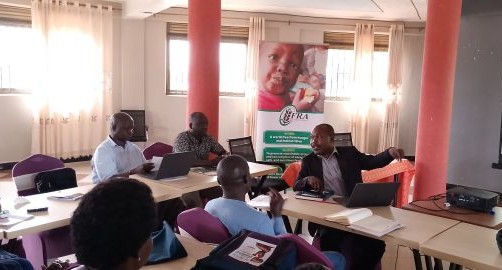KOTIDO, October 23, 2025 — The Parish Development Model [PDM] initiative in Kotido district is grappling with diversion of funds by the beneficiaries who have spent the money on consumption, jeopardising the initiative’s fundamental goals of enhancing economic growth and alleviating household poverty.
Francis Obita, the District Commercial Officer reaved this during a recent workshop organised by the Ministry of Local Government to integrate nutrition interventions into the PDM, with support from the Food Rights Alliance [FRA] Uganda.
Obita’s insights shed light on a troubling trend that undermines the intended impact of the PDM, launched in February 2022, to move 3.5 million households from the subsistence to the money economy through investment in the agricultural value chains.
He disclosed that, despite the registration of approximately 690 enterprises within the district, none have been managed according to the strategic objectives laid out in the PDM’s framework. “Many beneficiaries receive the PDM funds and unfortunately divert them to personal needs rather than investing them to maximise profits for their enterprises,” Obita stated, highlighting common misappropriations that include spending on alcohol, school fees, and household items.
The ramifications of this diversion are starkly illustrated in the district’s financial allocation data. While the PDM aimed to benefit 30,000 households, only 16,439 have received funds to date, amounting to Shs 17.8 billion.
Under the PDM, each parish receives Shs 100 million each year as a revolving fund, from which each programme beneficiary gets a soft loan of Shs 1mln to invest in the enterprises of their choice such as coffee, piggery, poultry keeping, and fish farming among others.
Obita expressed concern over the lack of tangible outcomes from this significant investment: “There is nothing to show for it,” he lamented. “Beneficiaries remain in abject poverty, and some are now unable to refund the money.” This is particularly concerning as the first beneficiaries are expected to begin repaying their loans in 2023.
Adding to the complexity, Charles Asiimwe, a private nutrition consultant and a pivotal figure in the PDM programme’s creation, identified a lack of diligence and expertise among local technocrats as a primary contributor to the diversion of funds. “The implementers are not well-versed in the implementation manuals,” Asiimwe cautioned, emphasising the critical need for thorough training and continuous support for local leaders.
Asiimwe underscored the essential roles of PDM Savings and Credit Cooperative Organisations [PDM SACCO] leaders, Parish Chiefs, and local government officials in the success of the programme.
He called for persistent follow-up and monitoring to ensure that beneficiaries adhere to their chosen enterprise pursuits. “It is crucial for programme implementers to familiarise themselves with all PDM handbooks,” Asiimwe advised. “A comprehensive understanding is vital for effective implementation of all PDM pillars, extending beyond financial inclusion.”
In response to the pressing issues, Florence Toss Auma, the acting Town Clerk of Lokitlebeu Town Council, proposed that the vetting of eligible beneficiaries be conducted at the sub-county level to ensure that only genuine candidates receive funding. “We need to ensure that the people who truly need support and have the capacity to manage the funds are the ones who receive them,” Auma stated.
This situation paints a picture of disillusionment among stakeholders as the PDM struggles against the backdrop of fund misallocation.
Advocates for poverty alleviation and economic development stress the importance of accountability and transparency in the programme execution, pointing to the urgent need for reforms within the PDM framework.
As Kotido district grapples with the challenges posed by fund diversion, Asiimwe notes that it is evident that a collective effort is required to steer the PDM back on course. “With the right measures in place, we believe that the initiative can still fulfill its promise of uplifting communities and fostering sustainable development, thereby transforming lives for the better,” said Asiimwe.
According to Asiimwe, while the diversion of PDM funds in Kotido district presents a significant setback, the collaboration of local leaders, enhanced training, and stringent vetting processes can pave the way for a revival of the program’s intentions.
https://thecooperator.news/kotido-pdm-sacco-leaders-get-tablets-to-speed-up-disbursement-of-funds/
Buy your copy of thecooperator magazine from one of our country-wide vending points or an e-copy on emag.thecooperator.news
